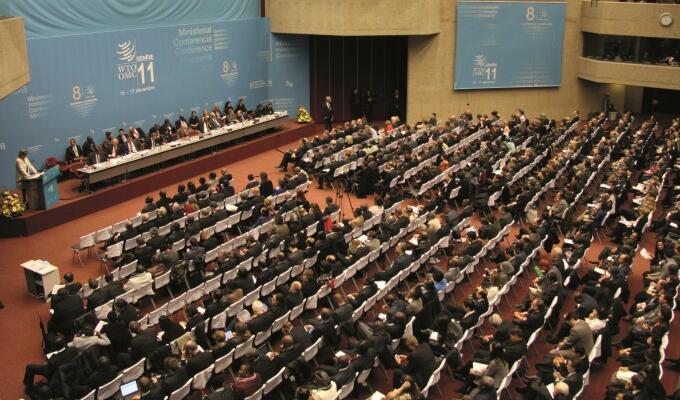
Assisting Samoa’s accession (en)
”For a small island in the Pacific, the road to the WTO in Geneva is long and winding,” said WTO Director-General Pascal Lamy at the Eighth WTO Ministerial Conference in December 2011. “Thanks to ITC, as well as to the WTO technical assistance teams for the support awarded to Samoa … and congratulations to the Samoan Government and its people for having reached the WTO accession finish line.”
After 13 years of deliberations, Samoa’s accession to the WTO was ratified, a key step towards accelerating the Pacific island nation’s economic growth and increasing the prosperity of its people.
Made possible by Window I contributions to the ITF, ITC provides assistance to LDCs such as Samoa that are working towards integration into the multilateral trading system. A major focus of this support is to bring the private sector actively into the WTO accession process and, following accession, to assist SMEs in exploiting new market opportunities offered by WTO membership. At the same time, ITC also works with acceding governments in identifying sectors with high export potential and developing export strategies.
Closer ties to the wider world
WTO membership gives LDCs the assurance that their trading partners will be bound by the same rules, putting local businesses on fair and equal footing with their international competitors. In Samoa’s case, the country has enjoyed preferential tariff levels with its main trading partners, however, those concessions are due to expire after Samoa graduates from LDC status this year. As a WTO member, Samoa has now gained favoured-nation status among all of the organization’s 155 members and access to markets that have been virtually closed to it until now.
Samoa is going to work hard to make the most of its membership, according to Samoan Deputy Prime Minister Fonotoe Lauofo. “The country is not going to sit on the sidelines, but is looking forward to active participation in discussions at the WTO,” he said. “After having negotiated membership for 13 years, the obvious question is how the long-coveted membership in this rule-based system will serve our needs.”
Membership also carries a symbolic value, as it raises the country’s profile and helps its tourism sector, said Oli Ah Mih, a board member of the Samoan Hotel Association and owner of a 70-room hotel in the capital, Apia. As an importer, he also welcomed the pressure that the WTO put on the government in the 1990s to lower import tariffs before commencing negotiations. “The government used to look upon tariffs as a tool for revenue generation,” he said. “This has changed.”
Getting over the fear
An essential part of the accession process was helping business people to “get over the fear” of WTO membership, notes Margaret Malua, Executive Secretary of the Samoan Chamber of Commerce and Industry. Their main concern was that the private sector did not have the strength, currently, to face greater competition in the domestic market. To facilitate understanding and debate, part of ITC’s role was to explain the policy-centred technical issues at the heart of the negotiation in practical business terms.
“We needed to provide the reasoning to the business community — how it would affect our trade policies and the competitiveness of their business,” Malua said. “There was also a call for transparency in government decisions, especially given the concern that Samoa would lose protection with WTO membership.”
Through a series of workshops, ITC facilitated a dialogue between the business community and government negotiators, ensuring that the interests of the private sector were understood and taken into account during the accession process.
These meetings culminated in November 2011 when ITC led a National Workshop on Samoa’s Accession to the WTO. The workshop drew more than 60 prominent stakeholders representing the private sector, the government, NGOs, civil society, women entrepreneurs and specific interests such as tourism, agriculture, church groups and village communities.
The consensus of the meeting was that that the accession terms negotiated by Samoa were satisfactory, as the immediate effect on the economy would be minimal, and that ample time was given for the country to adjust to the changes.
“ITC’s support was instrumental in alleviating the fears, in allowing the business community to learn from the experience of other LDCs that have joined the WTO and in finding a voice for the business community to influence the government’s negotiating position,” said Chamber of Commerce board member Sili Epa Tuioti. “The impact of ITC’s support reaches far beyond accession, as now the communication channels between the business community and those responsible for trade policy in government have been established. The government now routinely comes to the private sector to seek its views on policy.”
Beyond accession
Throughout the process ITC has stressed to the Samoan Government that it needs to develop a comprehensive trade policy and development policy to improve the quality of exports, exploit new markets and opportunities, and raise international competitiveness. During the past few years, ITC has supported Samoa in two technical assistance projects.
In 2009, ITC assisted the country in preparing a Fruits and Vegetables Sector Development Strategy, which identified market segments with the highest export potential. More recently, ITC has increased the export capacity of SMEs in the agri-processing sector by establishing ISO food safety management systems, a key requirement for many export markets. These projects were financed by the EU.
ITC’s involvement in Samoa’s WTO accession has now shifted to identifying how the country can benefit from membership. “We need to find the niches in which we are most competitive,” Tuioti said. “The opportunities are not in the mass market, but among niche, value-added products,” he added, citing organic agriculture as an example.
With Samoa’s accession complete, ITC’s commitment to the country does not end, said Friedrich von Kirchbach, Director of ITC’s Division of Country Programmes. “Indeed, we will continue to provide assistance in the post-accession phase to ensure smooth and orderly implementation of the commitments made by Samoa in its accession protocol.”



